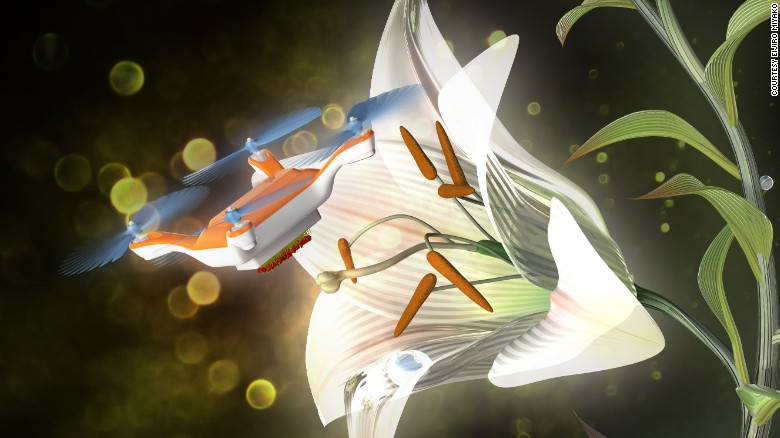Over in Japan, researchers have managed to create a drone that can pollinate a real flower. Traditionally a task only carried out by insects or animals, using drones to pollinate flowers could help combat against the decline we see in natural pollinators. Pollination is the natural process that enables plants to reproduce. In this process, the pollen needs to get from the male part of the flower to the female part in order to achieve fertilization. Usually, a pollinator such as a bird or an insect is required to act as the in-between career, but over the past few years, these have been on the decline, especially bees and butterflies. So instead, scientists have turned to drones for help.
The pollinating drone was created using a commercially available small drone that cost around $100. Researchers then took horse hair bristles that they’d taken from a paintbrush and stuck them on the underside of the drone, mimicking the torso of a bee. Lastly, these bristles were coated using a sticky gel in which to capture the pollen as the drone touched the flower. The gel is the secret ingredient to the drone’s success in pollinating flowers as it doesn’t dry up like most other types of gel.

During the study, pollination was successfully achieved using a very large flower and using a human to control the drone. Eijiro Miyako of the National Institute of Advanced Industrial Science and Technology in Japan is one of the authors of the study, and he commented, “I believe that some form of artificial intelligence and GPS would be very useful for the development of such automatic machines in the future.”
But, there is still a long way to go before the scientist can replicate the exact behaviors of pollinating insects and animals. “Pollinators have evolved specialized behaviors to work with different kinds of flowers. The proposed artificial pollinator does not have any of these specialized behaviors, and thus really can only ‘pollinate’ flowers that are extremely easy to pollinate”, said Christina Grozinger, Director of the Center for Pollinator Research at Penn State University.
Related Links;
- Pollinators Vital to Our Food Supply Under Threat
- Materially Engineered Artificial Pollinators
- Researchers use drone to pollinate a flower
More News to Read











